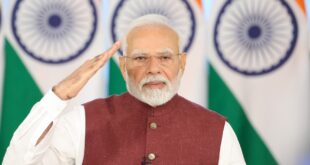Maldives and China signed MoU for currency transactions : In a move highlighting the Maldives’ growing economic partnership with China, the island nation recently signed a Memorandum of Understanding (MoU) with the People’s Bank of China (PBOC). This agreement is designed to facilitate current account transactions and direct investments using local currencies, further solidifying China’s economic footprint in the region. The deal comes just weeks after the Maldives signed an agreement with India to introduce the Unified Payments Interface (UPI), raising important questions about the nation’s strategic priorities and its evolving economic landscape.
Strengthening China-Maldives Relations
The Maldives’ decision to sign this MoU with China is not an isolated event but rather part of a broader strategy to bolster ties with one of its key economic partners. China has consistently been one of the largest contributors to the Maldivian economy, with bilateral trade exceeding USD 700 million. China is also a leading source of tourists to the island nation, further deepening economic ties.
Maldives and China signed MoU for currency transactions

This MoU is set to streamline trade and investment relations between the two countries by allowing for currency transactions in local denominations—China’s Renminbi (RMB) and the Maldivian Rufiyaa (MVR). This will eliminate the need for conversions into other international currencies like the US dollar, reducing transaction costs and facilitating smoother business operations.
Additionally, there is speculation that the Maldives could soon host a branch of the Industrial and Commercial Bank of China (ICBC), the largest bank in China. This move could further deepen financial linkages and enhance Chinese investments in the country, marking a significant development in the Maldives’ financial ecosystem.
China’s Economic Influence in the Maldives
China has long viewed the Maldives as a strategic partner in its larger Belt and Road Initiative (BRI), a massive infrastructure and investment project aimed at strengthening China’s influence globally. In recent years, China has funded several infrastructure projects in the Maldives, including bridges, airports, and housing developments. These investments have not only boosted economic growth but have also increased the Maldives’ reliance on Chinese capital.
The MoU signed with the People’s Bank of China can be seen as an extension of these efforts to enhance economic cooperation. As China continues to expand its influence in the Indian Ocean region, the Maldives is becoming an increasingly important partner. The two countries are also negotiating a Free Trade Agreement (FTA), which could further solidify their economic ties. According to reports, the formalities surrounding this agreement are nearly complete and could be activated soon.
Balancing Relations with India

While the Maldives is strengthening its ties with China, it is also seeking to maintain a balanced relationship with India. In August, India and the Maldives signed an agreement to introduce UPI in the Maldives, marking a significant milestone in their bilateral relations. UPI, developed by the National Payments Corporation of India (NPCI), is a real-time payment system that allows for instant inter-bank transactions through mobile devices. The introduction of UPI in the Maldives will make it easier for Indian tourists and businesses to conduct transactions, potentially boosting the Maldives’ tourism sector.
Despite this agreement, relations between the Maldives and India have been somewhat strained since President Mohamed Muizzu, known for his pro-China stance, took office in November 2023. In May 2024, India withdrew its military personnel from three aviation platforms used for medical evacuations at the request of President Muizzu, signaling a shift in the Maldives’ foreign policy.
However, recent developments indicate that both countries are working to mend ties. During Indian External Affairs Minister S. Jaishankar’s visit to the Maldives in August 2024, the Maldivian foreign ministry described the trip as a “significant milestone” and expressed a desire to strengthen the bilateral relationship. Furthermore, the Maldives is reportedly negotiating a Rupee-Rufiyaa currency arrangement with India, which could enhance trade and investment between the two nations.
A Strategic Realignment?
The Maldives’ recent agreements with both China and India suggest that the country is pursuing a strategy of balancing its relationships with these two regional powers. While China offers significant economic opportunities, particularly in the form of infrastructure investments and tourism, India remains a crucial partner, both economically and geographically.
The Maldives’ geographic location in the Indian Ocean makes it strategically important to both India and China. India has traditionally viewed the Maldives as part of its sphere of influence and has been concerned about China’s growing presence in the region. However, the Maldives appears to be navigating these geopolitical tensions by seeking to maintain strong ties with both countries.
Potential risks and opportunities for Maldives

While the MoU with China presents numerous opportunities for the Maldives, it also carries certain risks. Increased reliance on China for trade and investment could make the Maldives vulnerable to economic pressure from Beijing. Some critics argue that the Maldives, like other small nations involved in China’s Belt and Road Initiative, could find itself in a “debt trap” if it becomes overly reliant on Chinese loans and investments.
Maldives and China signed MoU for currency transactions
On the other hand, the MoU could also provide a much-needed boost to the Maldivian economy. By streamlining trade and investment transactions, the agreement could attract more Chinese businesses and tourists to the Maldives, helping the country recover from the economic downturn caused by the COVID-19 pandemic.
Furthermore, the potential establishment of a branch of the Industrial and Commercial Bank of China in the Maldives could enhance the country’s financial sector, providing more options for businesses and individuals looking to invest or conduct trade.
Conclusion
The Maldives’ decision to sign an MoU with China for currency transactions represents a significant step in its ongoing efforts to strengthen economic ties with its key trade partners. While China stands to gain significantly from this agreement, the Maldives is also working to maintain a balanced relationship with India, as evidenced by the recent UPI agreement and ongoing negotiations for a Rupee-Rufiyaa arrangement.
Maldives signs MoU with China for currency transactions after UPI agreement with India
As the Maldives continues to navigate its relationships with these two regional powers, it will need to carefully manage its economic and geopolitical interests. The MoU with China offers numerous opportunities for economic growth, but it also underscores the importance of maintaining a diverse set of partnerships to avoid becoming overly reliant on any one country.
In the coming years, it will be interesting to see how the Maldives balances its ties with both China and India and what impact these agreements will have on the nation’s long-term economic and political future.
Donald Trump safe after attempted assassination at Florida golf club
Bajaj Housing Finance IPO Investors Strike Gold, Shares Double on Listing Day
 Social Hungama Hindi News, हिंदी न्यूज़ , Hindi Samachar, हिंदी समाचार, Latest News in Hindi, Sarkari Result
Social Hungama Hindi News, हिंदी न्यूज़ , Hindi Samachar, हिंदी समाचार, Latest News in Hindi, Sarkari Result




